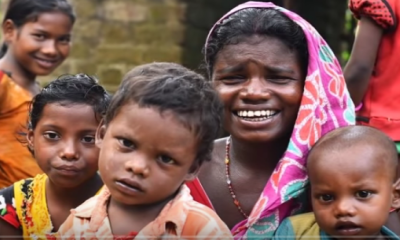[The Adivasi\Indigenous in India]
Dr. Jo Woodmanl: “The agenda behind this school is clear: Adani wants tribal lands…For KISS to partner so closely with a company so notorious on issues of indigenous rights in both India and Australia shows their true colors.”
Photo: YouTube
The Adivasi and other Indigenous peoples of India face discrimination, land theft, and the destruction of their culture.
“There are so many . . . primitive tribes — they don’t understand anything.”
The global movement to end racism must turn its attention to the world’s most vulnerable cultures — the indigenous people of Planet Earth — who are still enduring the forces of colonial genocide.
They are, after all, still obstacles to the planet’s moneyed interests.
I say these words not simply because protecting tribal cultures is humane, but also because it could well be crucial to everyone’s survival, including yours and mine. The dismissive arrogance evident in the above quote remains all too common. Those people are . . . savages, whatever, choose your judgmental noun.
The speaker above — the founder of India’s Kalinga Institute of Social Sciences, a.k.a., KISS, what is the world’s largest “boarding school” for indigenous children — called them monkeys. Some 30,000 indigenous, also known as Adivasi, children attend KISS, where, according to Survival International, they are shamed and forced to give up their languages and their cultures and become, you know, regular people.
Indeed, KISS, which describes itself as an “anthropological laboratory,” puts its mission thus in an explanatory video: “KISS has been fulfilling the millennium development goals of the United Nations Organization and transforming social liabilities into social assets, converting tax consumers into tax payers.”
The “social liabilities,” of course, are the Adivasi. They don’t pay their way in today’s world. They’re moochers: “tax consumers.” So the obvious solution is to take their children from them — i.e., shut down local village schools — and force them to attend boarding schools. There’s a bit of history behind this plan. It’s been part of the colonial subjugation of the “new world” for several centuries.
Survival International, which fights for the rights of indigenous people globally, calls these places “factory schools,” which currently house approximately 2 million indigenous children around the world. Survival International is deeply critical of KISS in particular, because the organization recently partnered with Adani, an international coal-mining company, to open a new factory school.
According to For Dr. Jo Woodman of Survival International: “The agenda behind this school is clear: Adani wants tribal lands, and tribal resistance is a major thorn in their sides. This school is a brazen and shameless attempt to ‘reprogram’ a generation of tribal children to see mining as ‘good’ and their spiritual and cultural connections to their land as ‘bad’ or ‘backwards.’ For KISS to partner so closely with a company so notorious on issues of indigenous rights in both India and Australia shows their true colors.”
And now, there’s a new chapter in the KISS controversy. The school has been selected as the site of the 2023 World Congress of Anthropology, a prestigious international gathering sponsored by the International Union of Anthropological and Ethnological Sciences. More than 10,000 anthropologists from 150 countries are expected to attend the event, according to India’s National Herald.
“Many Indian anthropologists and sociologists, however, are not pleased with the experiments at this laboratory,” the Herald informs us. “’Schools like KISS disinherit Adivasi children from their histories and describe Adivasi ways of life as backward and primitive,’ a statement released by activists and academics said. Children are not allowed to visit their families often, and this educational model makes kids ashamed of their parents and background.”
What makes all this reverberate for me with particular intensity is that indigenous cultures aren’t just “part of our history” — living museum pieces — but planetary stewards, spiritually in touch with nature, with life itself, in a way the “dominant culture” is not. To the dominant culture, this is a dead planet and our job is to dig it up, find the oil, find the coal, find the gold, and get rich while we still can. Yeah, yeah, global warming, but what’s that compared to profit?
So who are the savages here?
The world’s eco-salvation requires that we learn from indigenous cultures, not blot them out. What does it mean to be part of a living planet? Somehow the idea of being its boss — exploiting and dominating it — feels like the wrong answer.
Consider merely language itself. As Rupert Ross writes in his remarkable book, Returning to the Teachings, English — and probably all Western languages — is loaded with judgmental certainties. We don’t simply describe the world we inhabit, we continually judge it. Thus, as he points us, we are inundated with “pests,” “waste,” “weeds.” On and on and on. The tribal people are “monkeys.”
Such de facto, awareness-free judgments, Ross writes, “make it harder for us to remember that each thing we name that way is involved in complex relationships with a multitude of other things. And that their unique contributions are essential to maintaining the health of the ecosystem as a whole.”
He writes: “In my experience thus far, it seems that traditional people see our reliance on judgmental words as a very limiting way to know the world around us, and to deal with the people in it.”
We’re so certain of ourselves we’re destroying our own planet, along with its indigenous stewards, and we don’t know how to stop.
Robert Koehler ([email protected]), syndicated by PeaceVoice, is a Chicago award-winning journalist and editor. He is the author of Courage Grows Strong at the Wound.







